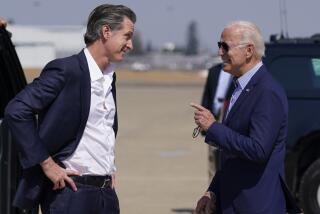Bush to Form Group to Raise Funds for ’88 Campaign
- Share via
WASHINGTON — Vice President George Bush, preparing a run for the presidency in 1988, said Friday that he will form a political action committee “fairly soon” and will campaign heavily next year for Republican senators seeking reelection.
Bush denied newspaper reports that former Sen. Nicholas F. Brady (R-N.J.) is already asking Republican leaders and strategists to commit themselves to the vice president, but added: “I’m not saying that he won’t some day. I hope ultimately he would.”
During an interview with The Times, Bush also spoke out on a number of domestic and foreign issues and said he has seen a confidential report that convinces him that chances are good for a summit meeting this year between President Reagan and Soviet leader Mikhail S. Gorbachev.
Bush said the report dealt with the meeting that Gorbachev held in Moscow earlier this week with a congressional delegation led by House Speaker Thomas P. (Tip) O’Neill Jr. (D-Mass.), who delivered a message from Reagan to the Soviet leader that expressed the President’s continued desire for a meeting of his own. The delegation is scheduled to return to the United States today.
“My gut instinct is that both sides want to have a meeting,” Bush said.
Bush, who has been following a heavy schedule of speeches, meetings and media interviews while President Reagan has been vacationing in California, laughed when reminded of what Reagan once said about the vice presidency before he became President: “It reminds me of an old rule of dog-sledding: Only the lead dog gets a change of scenery.”
“There’s some truth to that,” Bush said. “But I like what he’s been saying about the vice presidency more recently.” Reagan recently called Bush history’s greatest vice president.
A ‘Certain Constraint’
Bush has developed a close relationship with Reagan and said he never worries “about who was going to be the lead dog.” As vice president, Bush said, he operates under a “certain constraint . . . that comes from something I’d call loyalty or compatibility of interest or friendship.”
That would inhibit him, he said, from doing what a few vice presidents have done in the past, “and that is to kind of let it be known the vice president disagrees with the President, let it be known that he thinks so-and-so is screwing it up. I mean, I just couldn’t do that to the man. He’s been too good to me.”
Although Bush is not “in the mode” of seeking commitments for a presidential candidacy, he said Brady has been aiding him on political matters and was helpful in advising him to establish a political action committee to raise funds.
Bush said he decided to form a PAC because he is “almost the only one that’s mentioned in this presidential business” who does not have one.
Prospective presidential candidates who already have PACs include Rep. Jack Kemp (R-N.Y.), Senate Majority Leader Bob Dole (R-Kan.), former Sen. Howard H. Baker Jr. (R-Tenn.) and Sen. Edward M. Kennedy (D-Mass.).
Bush said he expects his PAC to be formed within 60 days but said that could change because of all the legal work required in setting up one.
Meanwhile, he is looking ahead to the off-year elections of 1986, when 22 Republicans and only 12 Democrats will be facing reelection campaigns. Bush, one of the Administration’s most indefatigable campaigners, said he will stump in 1986 “probably as much as I did in 1982, which was almost all fall.”
Because so many Republicans will be up for reelection, many political observers give the Democrats a good chance of regaining control of the Senate, which they lost in the 1982 elections. But Bush, declaring that “one thing we haven’t focused on is the vulnerability of some of the Democratic seats,” said he is confident that the GOP will retain control of the Senate.
Bush acknowledged that Reagan, who will return to Washington on Monday from a 10-day vacation in California, will face tough problems in Congress as he tries to win support for a budget-reduction plan and $14 million in covert aid for the contras, the rebels who are fighting the leftist Sandinista government of Nicaragua.
Reagan and Senate Republican leaders have been severely criticized for agreeing on a budget-reduction compromise that would limit Social Security cost-of-living increases for three years to inflation minus two percentage points, with a guarantee that benefits would go up at least 2% annually.
Bush said he hoped that House Minority Leader Robert H. Michel (R-Ill.) was wrong when he suggested recently that the Administration spent so much political capital in securing congressional funding for the MX missile that it would be unable to win support for aid to the contras.
The vice president said that, although he does not know how the measure will fare in Congress, “I think it is absolutely essential we can continue to support them (the contras).”
Other leaders in the hemisphere back Reagan’s plan for supporting the contras and seeking a solution to the Nicaraguan crisis, he said. “They’re tired of this damn thing. I think they’d like to see it succeed, and I don’t think anyone wants to see the . . . solidification of a Marxist regime in Nicaragua.”
More to Read
Get the L.A. Times Politics newsletter
Deeply reported insights into legislation, politics and policy from Sacramento, Washington and beyond. In your inbox twice per week.
You may occasionally receive promotional content from the Los Angeles Times.










